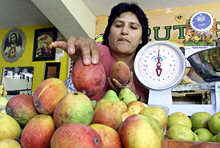
Typical street scene in Santa Ana, El Salvador. (Photo: iStock)
IMF Survey: Attack Poverty, Inequality—de Rato
September 20, 2007
- De Rato advocates policies that focus spending on poor
- Says inequality is important issue in Latin America
- Pinpoints fiscal policy, financial sector, institutional reform
High growth and low inflation are essential to economic development, but there is a "powerful case" for directly attacking poverty, International Monetary Fund Managing Director Rodrigo de Rato said in a speech in Peru.

Small business owner in Lima, Peru—which is a leader in field of microfinance credit, de Rato tells conference (photo: Pilar Olivares/Reuters)
LATIN AMERICA
He said the biggest contributions can be made in fiscal policy, financial sector reform, and institutional reform.
"The urgency of addressing poverty and inequality in Latin America" is especially high because of "evidence from other regions that globalization can make inequality within countries worse, because of the higher skill premium associated with technological advance and because of the unequal distribution of benefits from global trade."
"Fortunately, there is much that policy makers can do to reduce inequality and poverty, while also supporting growth and stability," de Rato said at a September 20 conference on "Macroeconomics and Equity" sponsored jointly by the IMF and the Economic Commission on Latin America and the Caribbean.
De Rato told the Lima audience that attacking poverty makes sense from both a social justice and economic perspective. "The human costs of poverty are profound, and there is increasing evidence that the economic costs are great too."
He said the areas in which the biggest contributions can be made are "fiscal policy, financial sector reform, and institutional reform."
Fiscal Policy. "Handled well, fiscal policy can be the lever that supports growth and reduces inequality," he said, and noted that many countries have undertaken initiatives that will help. "For example, on the revenue side, a number of countries have recently introduced taxes that will be paid mostly by those with the greatest capacity to pay—especially taxes on vehicles, other property, and financial income."
Targeted social assistance
De Rato also urged governments to pursue policies that focus spending on the poor rather than those that benefit the better off. He suggested that general subsidies for oil products and electricity be replaced by targeted social assistance or that educational subsidies be reworked.
A recent IMF study "estimated that over half the benefits of spending" on higher education benefits the richest 20 percent of the population, while the poorest 20 percent "get just 2 percent of the benefits. Equity could be improved if cost recovery was increased at the tertiary level, and if the proceeds were then used to strengthen the quality of primary and secondary education, where spending is of much more benefit to poorer people."
He said that governments should not neglect investment and noted that in Latin America, "capital spending has fallen as a proportion of total government spending" and increases in private sector investment have not materialized. "This must lead one to ask whether the combination of tax laws and public expenditure polices in key sectors are sufficiently encouraging to investment."
Financial sector reform. De Rato said it is important to give wider access to credit and financial services, "which many of the poor do not have." Small and medium-sized enterprises, which often drive innovation and productivity growth, "need access to finance to grow themselves," de Rato said.
Microfinance credit
Citing microfinance institutions that make small loans to poor people in low-income areas, de Rato noted that with an average annual growth of 25 percent in microfinance credit, Peru is "one of the leaders in this field." He also cited the need to reduce the costs of financial intermediation for all levels of society and to improve bankruptcy laws "to create a better environment for lending."
Strengthening institutions. There has already been progress here, de Rato said. Sound macroeconomic policies have helped improve central banks and fiscal institutions and made for better financial supervision and a tougher stance on corruption.
De Rato stated that consensus needs to be built around strengthening "the key institutions for employment, investment, and poverty reduction, and around policies that promote growth in sectors that will generate the greatest improvement in income for the majority of citizens." He singled out simplifying procedures for establishing new businesses, liberalizing employment laws and improving management of social programs, which directly affect the poor."
While calling for a direct targeting of poverty, De Rato said that the higher economic growth and lower inflation in Latin America in recent years "are enormously important achievements." It's clear, he said, that inflation is an "insidious tax on the poor, who are least able to protect themselves."
Economic growth is fundamental for the society as a whole and the prospects of both poor and average citizens, the managing director told the Lima audience. "If the most active citizens of a country do not have hope that their standard of living will rise, they will devote their energies to moving out instead of moving up, to the detriment of the whole society."


